- Home
- Gail Carriger
How to Marry a Werewolf Page 7
How to Marry a Werewolf Read online
Page 7
Their reel ended, and Faith was profoundly grateful for the short and invigorating nature of a dance that prohibited too much intimate talk. Then she was horrified to remember that this was the dinner dance and he was shortly to find her a plate and keep her company while she ate.
Lord Ambrose led her from the floor. His touch was cold. He seemed some marble god of old somehow squeezed into the confines of polite society.
“I see why the werewolves like you.” It might have been a compliment.
“Do you indeed?” said a mellow voice, all the more threatening for its calmness.
Major Channing was back. He moved in a delicate but firm motion, and Faith found herself neatly separated from the vampire. The werewolf now stood between her and Lord Ambrose.
Lord Ambrose hissed, surprised and snakelike. “That was the dinner dance.”
“You signed for it without request. I watched you. Regardless, she is American. She knows not what she offers, to dance the repast reel with a vampire.”
“Ignorance of social rules does not pardon her blunder.”
“You’re crabby because you’re hungry. That does not change the fact that this one was my prey from the beginning.” Channing’s tone was beyond mocking.
Lord Ambrose looked highly affronted. “You cannot have a prior claim to this lady.”
“I saw her first,” answered Major Channing, sounding not unlike a child with his favorite toy.
“Never doubt, wolf, that we make the rules here. Have you offered her a claviger contract?”
“Stand down, blood-sucker.” Channing sounded every inch the soldier.
Faith looked between the two posturing predators. “What about what I want?”
The two men looked at her, startled.
She turned to Lord Ambrose. “No thanks for my part, in either regard. I don’t want to be your meal for the evening, nor your indentured drone for the year. I’m not creative, even if I were interested in metamorphosis. Which I’m not. Besides, as a woman, my chances of surviving a bite are tiny. Frankly, I don’t like those odds and I find the idea of immortality off-putting. Although you honor me with your consideration.”
She added that last bit because he was, after all, a vampire and an aristocrat. It wouldn’t do to cause offense.
Channing grumbled. “He should have put it in writing.”
Faith knew little about vampire drones and only slightly more about clavigers. She had once spent too much time with a claviger, but Kit had been cagey about the details of his service. She knew they provided daylight protection for their supernatural masters and that they worked to curry enough favor and show enough potential to be turned immortal. Vampire drones, Faith felt, probably had it worse, since they were also food.
Had Lord Ambrose’s demanding the dinner dance meant something more significant than his fangs in her neck?
She gave Channing a questioning look.
He answered her. “It’s not done simply to spout it out like that as a verbal insistence. The invitation to dine on you, I mean to say. And signing your dance card is underhanded. You know, Ambrose, that it won’t hold up in court.”
Lord Ambrose looked faintly embarrassed. “Well, you would go and get all territorial on me. Can’t have that.”
Channing arched a brow. “I am not interested in her as a claviger, either, my good man.”
“No, I didn’t really believe you were.”
Channing snorted, leaned back, and crossed his arms. But he did not shift his protective stance between the two of them. Faith wondered how closely he’d watched them dancing.
She narrowed her eyes at him. “Do you always cause a scene, Major?”
“Always. It’s why they don’t let me out much. I’m badly mannered and indifferent to society’s mores.”
“He’s a depraved old bounder. Why do you even pass the time of night with such a fellow, Miss Wigglesworth? A lady of refinement such as yourself.” The vampire looked at her, but he did not expect an answer. It was all said to cut Major Channing down.
Faith grabbed the opening he had given her, nonetheless. “Honesty has its appeal.”
“I very much doubt that. Especially in his case. You recognize his prior claim, then?”
Faith wished she fully understood the undercurrents here. But despite his aggravating ways, she felt safer throwing in her lot with Channing than Lord Ambrose. At least Channing came with a Biffy attachment. And while werewolves took wives, vampires did not. The blood-sucker’s game was much deadlier and more permanent.
So, she said, “I do.”
Major Channing’s eyes went from cold chips of icy indifference to pale blue flames of victory.
Lord Ambrose gave a curt little bow to Faith and, ignoring the werewolf, left them both.
Major Channing looked down at her, once more cool and contained. “He smells of rotten flesh and the long dead, and after that dance, so do you. I hate it.”
Faith winced. “Well, it’ll wear off eventually. It was a pretty short dance.”
He grunted.
Faith was curious enough to be unguarded. “What do I normally smell like?”
“Plum pudding soaked in brandy,” he answered promptly, “heady and rich with raisins.”
“Raisins! I smell of booze and raisins? I…” Faith lost her words at that. She glared at Major Channing, who was looking amused by her show of temper.
“I believe I’ll find my own way to supper, sir. Go away and pester someone else. Raisins indeed!”
Major Channing, mouth twitching with what could only be a repressed smile, drifted away, quite pleased with himself.
Faith’s life became a whirlwind of entertainments and petty obligations after that. She and Teddy were the talk of the ton, to be found in most drawing rooms, paying calls and receiving them, and everything that came after.
The papers described Miss Wigglesworth as effervescent yet sanguine in a manner that was part insult, part admiration. Brimming with American nerve, they said. Faith decided to take this as a compliment. Apparently, half of London’s eligible bachelors decided to take it as a ringing endorsement. Although it was possible they also thought she was wealthy. Americans had that reputation, too. Whatever the cause, the result was that the sitting room of the Iftercast house swelled with flowers from eager swains; there was even, unfortunately, some poetry.
“This one is an ode to my eyes, which are compared in one breath to sapphires which is then rhymed with camp-fires and in the next breath to fish eggs – which can’t be complimentary.” Faith put down the missive and looked at Teddy, who was red-faced in an effort not to laugh. “Can it?”
“I am certain he means to compliment.”
“Well, then, the pen does him no favors.” Faith, it must be said, was equally uninterested in the flowers. Botany, after all, was not her field of scientific focus.
Teddy, being Teddy, was pleased with her cousin’s success and not nearly so envious as Faith dreaded she might be. Maybe it was in Teddy’s nature to be generous of spirit, or maybe it was that one of the bouquets (a small modest one, containing mainly beautiful purple alfalfa flowers) was from young Mr Rafterwit. The sweetly bumbling Mr Rafterwit was a barrister of sufficient means to satisfy Mrs Iftercast, sufficient connections to satisfy Mr Iftercast, and sufficient horses to satisfy Teddy.
“He’s very sporting.” Teddy smiled over the purple blooms.
“Good, you won’t get any poems.”
“He keeps a stable of twelve horses in the country with a dear friend, for the purposes of breeding to race and to jump. He had a flyer in Ascot two years ago.”
“And his character?” pressed Faith, because there was more to life than horses and pecuniary advances and connections, even if they came with alfalfa flowers.
“He’s very quiet.”
“Well, that should suit you.”
“Oh?” Teddy laughed.
Faith blanched. “I didn’t
mean it like that!”
“Bah. I know I am a chatterbox. But I meant to imply that he is quiet when I meet with him. It is difficult – at a ball or even a dinner – to fully comprehend a gentleman’s character, don’t you find? I hardly feel I know him at all.”
Faith nodded her agreement. It was challenging.
Throughout the course of the many balls and dinners over the past month, Faith had met and conversed with countless gentlemen. She had even met one or two more of the London Pack. Both proved to be large and charming, and were probably admirable prospective husbands for a soiled, if pretty, American with a substantial rock collection. Except, Faith did not feel she knew them at all. She certainly did not feel anything like the fire of personality that scorched her whenever she was in Major Channing’s presence.
Of him, strangely, she knew a little. He did not even pretend to civility. Instead, he jumped directly into the meat of intimacy whenever they conversed, in a way Faith ought to have found shocking but instead found invigorating. She seemed unable to stop thinking about him and had come to crave their increasingly ridiculous banter.
“Why do you like rocks so much that you feel compelled to defiance and defence of them, my Lazuli?” He sat next to her at a supper party, eating raw liver from a cut-glass bowl while she sipped soup and tried not to splash.
Faith felt a little thrill at the possessiveness in the name. She willfully ignored it, of course, whenever he used it, but she liked that he’d given it to her – special. As if she mattered to him.
Faith had been conversing with Mr Koverswill, on her other side. Mr Koverswill had severe hair, pronounced ears, and an eye for trends. He’d told her (in confidence) that hair muffs were due for a resurgence. Faith had been moved to tap his wrist with her fan and tell him that the very idea was hair-raising. Mr Koverswill was utterly charmed by such forthright American wit. But then the hostess demanded his attention with some question about shawls, and Faith was left abandoned without conversation.
Channing had drawn her attention back to him, saving her from awkward silence with talk of geology. Not that he needed geology to get her attention. Faith always seemed oddly aware of him. Tonight, the moment he walked into the drawing room before dinner, the hairs on the back of her neck had tingled. Also, he tended to be near her if possible. She liked it, both his nearness and her awareness of it.
There was no question he would sit next to her at dinner. The hostess had arranged it and been smug about it. Everyone wanted to watch Major Channing attempt to court society’s newly minted American sensation. Faith didn’t mind. London’s efforts to amuse itself at Channing’s expense only increased the frequency of their encounters.
“Does hiking after specimens make you feel free of societal constraints?” His eyes were focused on hers and he seemed genuinely interested.
Faith was drawn into remembering her strolls about the countryside back home, collecting and exploring, and her one trip westward under the liberty and vastness of the Colorado skies. She had always insisted that whenever her family traveled, they must stop in places they would ordinarily never consider except for her enthusiasm for the landscape. And then she must mitigate their exasperation at her continued delays.
She tried to explain her fascination. “Rocks represent so much time and space, so much history. Yet they’re so solid and unchanging themselves.”
“You are attracted to ancient things,” he concluded.
I’m attracted to hard and sharp and immovable objects with predictable characteristics, she thought.
He regarded her closely. His eyes traced the memory of freckles on her nose, when she’d spent too much time exploring under the hot sun. Faded now. “We are not all so static as that. Some of us are sitting in the wrong time and place, even though we appear to walk about in this one. And some of us like change too much. We revel in the mayflies of life, for all we are stuck with mere existence ourselves.”
He’s telling me that he is not that kind of immortal. He’s not a rock for me to collect. He’s not steady and he’ll not be constant.
She wondered why he was being so obvious in his interest if it wasn’t genuine. She wondered if his intentions were honest. Was he chasing her in order to catch her or merely to keep others away? If he caught her, would he keep her? And do I want that or am I also just enjoying the chase?
Mr Koverswill returned his attention to her then. “Oh, Miss Wigglesworth, are you a lover of history of the ancient world as well? I have recently returned from Rome.”
“Italy? Was it everything you hoped?” Faith knew well how to keep a gentleman engaged. The young man puffed up under her regard. She felt Channing, on her other side, relax back in his seat, watchful.
Mr Koverswill put down his soup spoon. “A strange place. No supernatural creatures at all. No offence, Major Channing.”
“None taken. You are wrong, of course.”
“Am I indeed?”
Faith could not help but be surprised. “He is? I thought Italy was confirmed anti-supernatural.”
“Merely because they do not like us does not mean we are not there. I visited recently myself.”
Mr Koverswill cocked an eyebrow. “Indeed, sir.”
Channing frowned; Faith wanted to reach out to smooth the lines off his forehead. “Perhaps not so recently – about twenty years ago.”
“Were you there as a tourist, too?” Mr Koverswill asked.
“No. I was there to kill someone.”
Mr Koverswill blanched.
Faith felt oddly proud. “What other reason could anyone have for visiting Italy?”
“And did you succeed?” Mr Koverswill asked, a tad injudiciously, Faith thought.
“Of course. Gave me terrible indigestion.”
Faith giggled. She couldn’t help it; poor Mr Koverswill’s face was priceless. “You can’t go around just eating Italians, Major. No matter what their belief system.”
“Can you think of a better reason?”
Faith couldn’t help it; she ought to focus again on Mr Koverswill, but ribbing Channing was so much fun. “Never say you’re an idealist, Major?”
“No, I simply don’t condone mandates demanding species extermination. Especially not if it is my species.”
“There, you see, Mr Koverswill?” said Faith in a desperate attempt not to keep ignoring the poor man. “It’s nothing personal. Major Channing is just grumpy about his politics.”
Channing laughed – a brief bark that was half surprise at his own amusement.
From across the table someone gasped, at which juncture Faith realized all attention was on them.
“Aren’t we all, Miss Wigglesworth?” The hostess wore a pleased smile, her eyes glittering with appraisal. “Aren’t we all?”
Miss Wigglesworth was described in the papers the next morning as remarkably poised for her age, mistress of witty repartee, and capable of amusing even werewolves on occasion.
Mr Koverswill sent ’round a beautiful bouquet of hothouse orchids.
“He has six thousand a year,” said Teddy.
“Major Channing has been to Italy,” said Faith, not really seeing the flowers.
Teddy, confused, agreed readily enough. “Yes, well, does that diminish his suit? He was in the army for a good long while, and Italy isn’t that bad. Is it?”
Faith could see Channing as a soldier. He commanded easily, and he was cold and tough. “He hasn’t sent me any flowers.” This was more annoying than it should be. But also, she knew Channing would never want to be one of many. So, why would he send flowers?
“Do you think that has something to do with Italy?”
Faith giggled. “Oh, never mind Italy.”
Teddy blinked at her. “I never have minded it. You’re the one who brought it up.”
“Where are we off to today?” Faith asked the most distracting thing she could think of.
“Oh! Well. There’s a picnic...” And Teddy wa
s off.
There was a picnic. It was outside in the full sun, so Major Channing could not join them. No werewolf could.
Faith missed him. She missed his presence, his constant challenge, the way he sometimes affected her breathing, and how she sometimes caught him watching the pulse at her throat.
She dressed with care that evening. Even though it was a gown she’d worn before, he hadn’t yet seen her in it. She suspected he would be at the small private ball that night. Hostesses had started inviting him whenever they invited Faith. It was a kind of game amongst them.
The werewolf who’d once been nothing but absent from the social scene was becoming ubiquitous. But only if Miss Wigglesworth was also there. Now every hostess was eager to host the event at which the inevitable engagement was announced. It was true other men courted her, but her attention was nearly as marked as his.
Faith knew she ought to hide her regard. It was too bold. But the ton seemed disposed to humor her as confident as opposed to rash. And Faith had started to hope that Channing would not ruin her. That this werewolf could be trusted. That his intentions might even be honorable.
So, when he was at the ball that night and took the very first waltz, she let herself dream a little.
“Why will only a werewolf do?” he asked, as he twirled her expertly around the floor. “Are you frightened of true human affection, or is there something you find lacking in mortal men?”
It was a bold question, but Faith was tired of dissembling. She liked this too much. She liked him too much. “It is not something lacking in them so much as myself.” She leaned into his impossible strength as if he might lift her up and spin her into flight.
“You are either falsely modest or sinfully devalued,” he concluded.
I am exactly what I deserve to be, she thought. And I will make the best of it.
“My mother thinks a werewolf would be good for me.”
“And you always do what your mother wishes?”
“Almost never, actually. I’m trying to be biddable for a change.”
He chuckled and then sobered. “I don’t think I’d be very good for you.” He looked worn and sad.

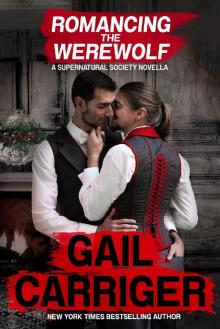 Romancing the Werewolf
Romancing the Werewolf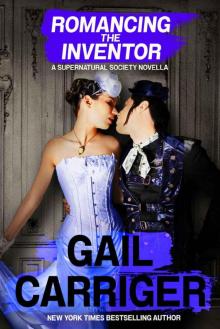 Romancing the Inventor
Romancing the Inventor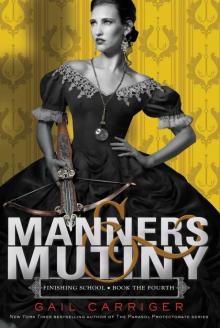 Manners & Mutiny
Manners & Mutiny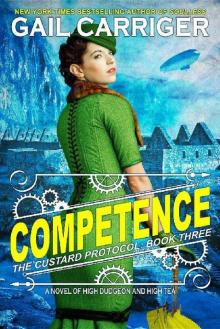 Competence
Competence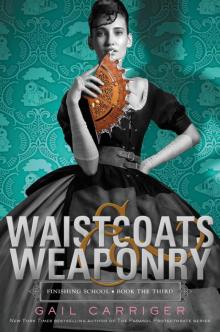 Waistcoats & Weaponry
Waistcoats & Weaponry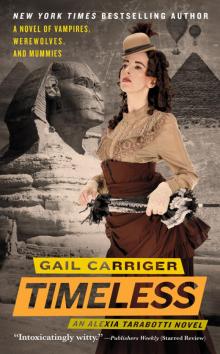 Changeless
Changeless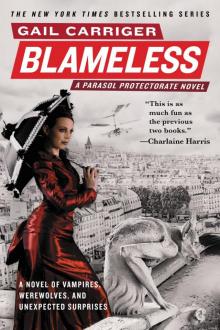 Blameless
Blameless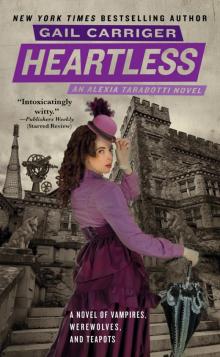 Soulless
Soulless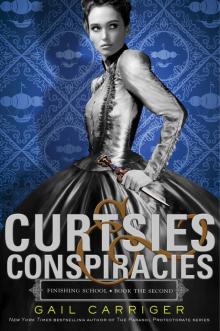 Curtsies & Conspiracies
Curtsies & Conspiracies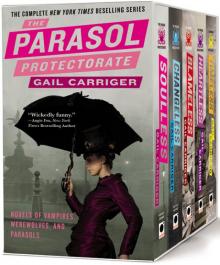 The Parasol Protectorate Boxed Set
The Parasol Protectorate Boxed Set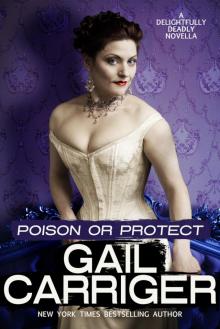 D2D_Poison or Protect
D2D_Poison or Protect Funny Fantasy
Funny Fantasy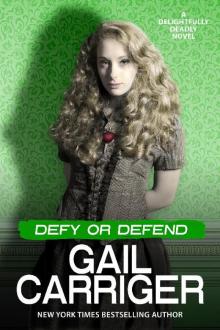 Defy or Defend
Defy or Defend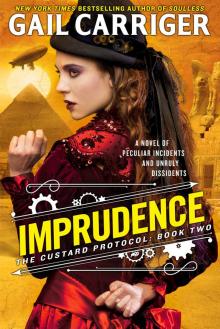 Imprudence
Imprudence Reticence
Reticence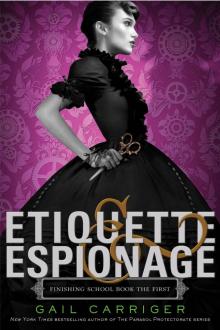 Etiquette & Espionage
Etiquette & Espionage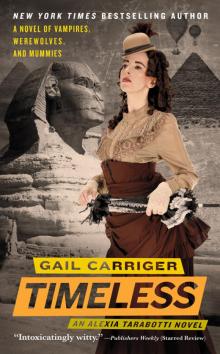 Heartless
Heartless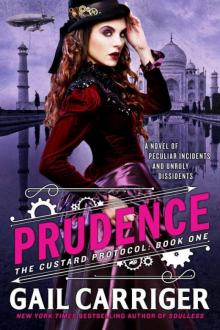 Prudence
Prudence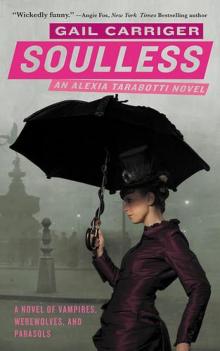 Parasol Protectorate 01 - Soulless
Parasol Protectorate 01 - Soulless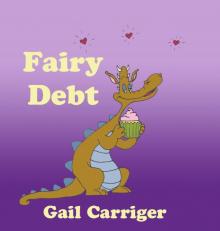 Fairy Debt
Fairy Debt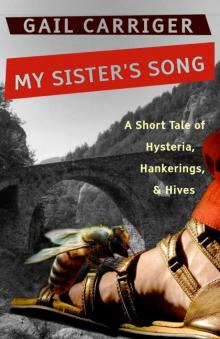 My Sister's Song
My Sister's Song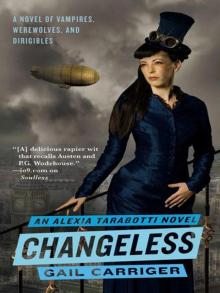 Changeless: The Parasol Protectorate: Book the Second
Changeless: The Parasol Protectorate: Book the Second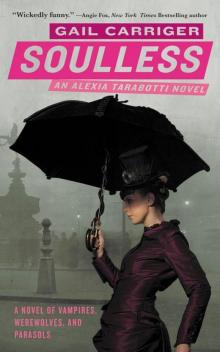 Soulless: The Parasol Protectorate: Book the First
Soulless: The Parasol Protectorate: Book the First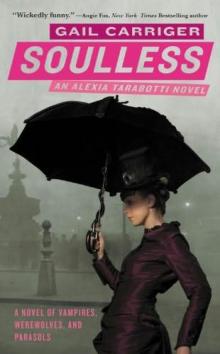 Soulless pp-1
Soulless pp-1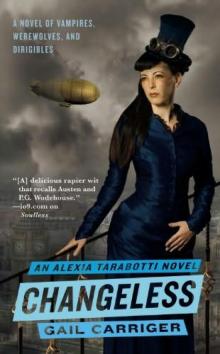 Changeless pp-2
Changeless pp-2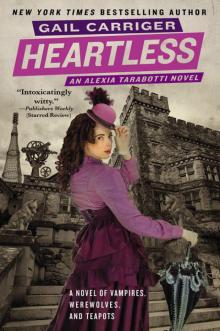 Heartless: The Parasol Protectorate: Book the Fourth
Heartless: The Parasol Protectorate: Book the Fourth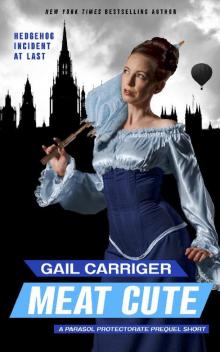 Meat Cute
Meat Cute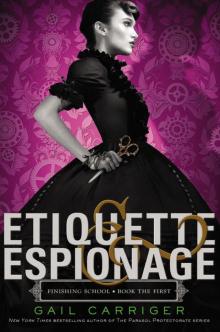 Etiquette & Espionage (Finishing School)
Etiquette & Espionage (Finishing School)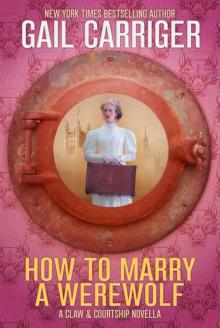 How To Marry A Werewolf (Claw & Courtship Novella Book 1)
How To Marry A Werewolf (Claw & Courtship Novella Book 1)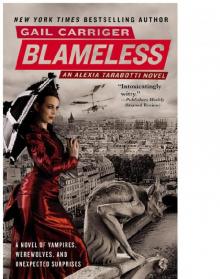 Blameless: The Parasol Protectorate: Book the Third
Blameless: The Parasol Protectorate: Book the Third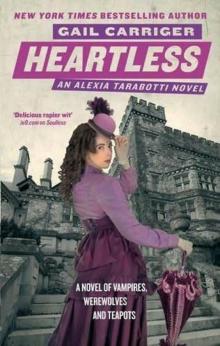 Heartless pp-4
Heartless pp-4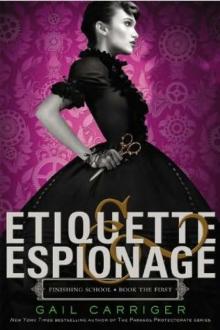 Etiquette & Espionage fs-1
Etiquette & Espionage fs-1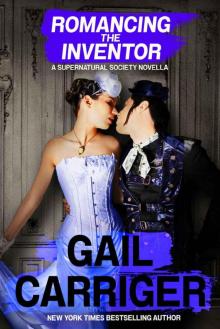 Romancing the Inventor: A Supernatural Society Novella
Romancing the Inventor: A Supernatural Society Novella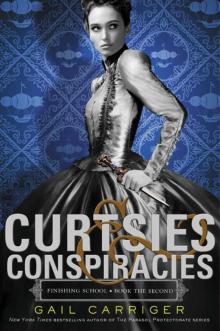 Curtsies & Conspiracies fs-2
Curtsies & Conspiracies fs-2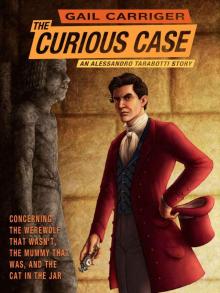 The Curious Case of the Werewolf That Wasn't, the Mummy That Was, and the Cat in the Jar (The Parasol Protectorate Book 6)
The Curious Case of the Werewolf That Wasn't, the Mummy That Was, and the Cat in the Jar (The Parasol Protectorate Book 6)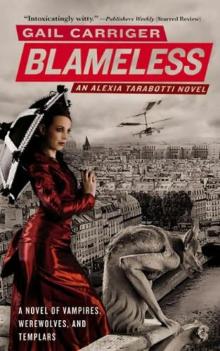 Blameless pp-3
Blameless pp-3